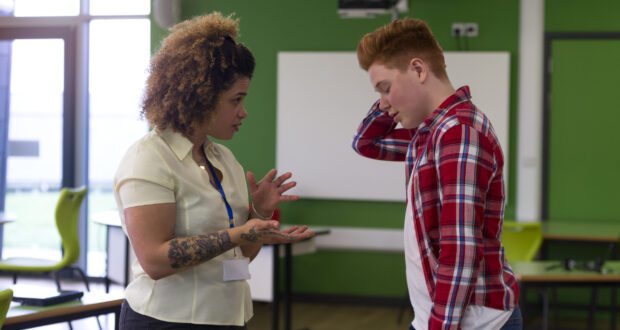A University of South Australia (UniSA) study on school discipline discourse found 'gaps' in the NSW behaviour strategy, and said suspending students could exacerbate bad behaviour in disadvantaged kids who need more support in the classroom.
The study said that whilst suspension and expulsion is effective in mitigating safety concerns about badly behaved students, it can have severe adverse effects on vulnerable children, including those from low-SES areas or students who are living with a disability.
A 2020 school discipline policy review in NSW, that resulted in the new behaviour strategy, recommended schools shift away from punishing students and towards supporting their wellbeing.
The strategy acknowledged research that shows suspending students can lead to poorer life outcomes and disengagement from education, and noted it had received submissions from principals who explained suspension and expulsion practices are only used as a last resort.
Lead researcher Professor Anna Sullivan said while there was more behaviour support and management in the behaviour strategy, new disciplinary practices still relied on some punitive measures.
“Suspensions and expulsions have been the mainstay of schools’ behaviour management practices for decades, regardless of research finding that they are ineffective for disciplining bad behaviours,” she said.
“There is a clear relationship between school suspensions and a range of detrimental health outcomes, including alienation from school, involvement with antisocial peers, use of alcohol and smoking, and a lower quality of school life – and this contributes to a higher risk of dropping out of school and possible illegal behaviour.
“Boys, Aboriginal students, students from low SES backgrounds, and students with a disability are disproportionately excluded from schools.
“There is a distinct blind spot about how school suspensions and expulsions perpetuate wider social inequalities."
The study found nine behaviour management 'gaps' in the strategy; most notably the misalignment of data that shows how many times schools are suspending students, and how well they are dealing with misbehaving students.
The research said because department data is overarching and vague, it is difficult to match it to individual school stats, which measure how many times they used exclusionary practices in a year, along with a 'deeper, more contextualised understanding of how student behaviour is managed.'
'Much of our understanding of exclusionary practices hinges upon data that are ambiguous and incomplete,' the study says.
'Differences in definitions and measurements, as well as school-level variations in the extent to which data are recorded, can all hide the ways in which exclusionary practices are applied.
'Thus, statistics may only provide a partial picture because ‘students may be experiencing unreported school exclusion as teachers and school personnel game a broken system.'
Researchers also pointed out alternative learning or behaviour centres in schools could skew data – schools could be excluding students to manage behaviour without officially suspending or expelling them.
Other gaps include a lack of supports for socially unequal students, issues with how teachers and principals perceive students with complex needs, and a lack of a student voice in the strategy.
“Schools and policy makers must look beyond challenging behaviours to understand what is contributing to the cause – rather than treating the effect – and it’s this missing information that’s needed to develop new school policies," Professor Sullivan said.
How NSW suspension rules have changed
Overwhelmingly, parents approved of a the then Perrottet government's policy to halve the number of times a student could be suspended, and cap the number of times they could be sent home to three instances per year.
The changes, which came into effect in Term 2, 2022, addressed numbers that showed students with disabilities, undiagnosed disorders such as autism or ADHD, and those from Indigenous backgrounds were being disproportionately suspended and expelled.
Most teachers and the NSW Teacher's Federation (NSWTF) opposed the change, claiming teachers did not have the time or resources to handle problem students, and would not be able to protect themselves from aggressive behaviour as effectively.
A Minns government policy took over from Term 1 this year, which raised the cap on the number of times principals could suspend students in kindergarten to year two from five days to 30 days, and from 10 days to 45 days for year three to 12 students.
When students reached the cap, schools needed departmental approval to continue their suspension.
Principals could also send students home immediately again, which, unless the student posed an immediate serious safety threat, the 2022 policy banned.
'Continued disobedience' and 'disruptive behaviour' were also reinstated as grounds for suspension.
The new policy was rolled out to give teachers and principals more authority, improve student behaviour, and protect students and staff.
Education Minister Prue Car also said well behaved students need quality time in the classroom without the distraction of badly behaved peers.
The change echoed the wishes of the teacher's union made years prior, although the NSWTF (then acting) president Henry Rajendra said more resources such as specialist behaviour staff would need to be given to schools to aid the transition.
"The procedures restore and uphold the authority of principals and teachers to manage student behaviour with such decisions supported by the department," he said.
"[They] replace the flawed documents of the previous government that failed to acknowledge the professional judgment of principals and teachers nor guaranteed an orderly learning environment for children."
Proposed Queensland reforms have also sparked concerns about increasing teacher and principal workloads.
There is an ongoing Senate inquiry into the behaviour of students in the classroom.
Do you have an idea for a story?Email [email protected]
 Education Review The latest in education news
Education Review The latest in education news
